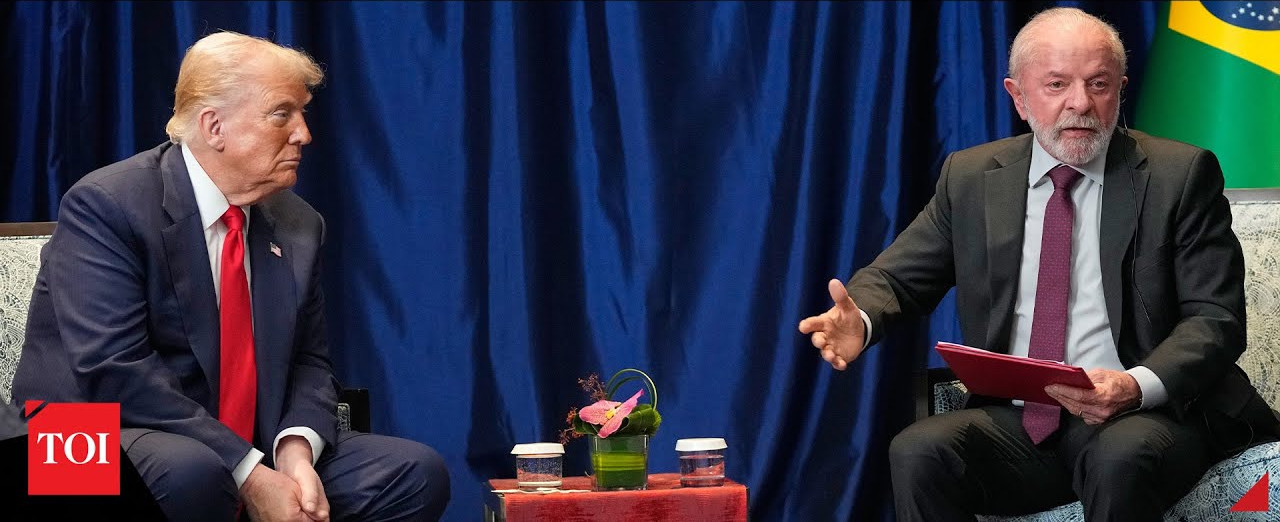|
ASEAN Summit: The meeting between Lula and Trump, and the aggressive US policy in Latin America Unlike the humiliating insults directed at Volodymyr Zelensky of Ukraine and Cyril Ramaphosa of South Africa, who were treated with utter discourtesy by Trump, Lula received kind words from the US president. Trump expressed his admiration for Lula's political career, praised his energy as head of state, and showed particular interest in him securing a third term—an ambition shared not only by Trump but also by figures in the "Make America Great Again" movement, such as Steve Bannon. Finally, Trump reiterated his interest in traveling to Brazil. The Ibovespa index reached a record high after the meeting, and the dollar fell to R$5.36, also influenced by news of a relaxation in trade tensions between the United States and China (Beijing reportedly indicated that it would accept the extension of the application of new restrictive rules for rare earth exports and showed itself favorable to the purchase of US soybeans). According to Brazilian Foreign Minister Mauro Vieira, the conversation “did not include taboo subjects,” but rather focused on the suspension of the 50% tariffs imposed on Brazilian exports, as well as the end of the Magnitsky Act sanctions against state figures such as Judge Alexandre de Moraes. Apparently, Trump gave new instructions to his team, headed by Secretary of State Marco Rubio, to advance bilateral negotiations. The Brazilian Foreign Ministry released images of the meeting that Mauro Vieira and his advisors held with representatives of the Trump administration, still in Malaysia, to begin talks on the trade disputes. Difficulties are looming. From a political standpoint, Lula continued the rapprochement he had been forging with Trump since the 80th United Nations General Assembly in September. On that occasion, a 39-second encounter was enough for Trump to praise the Brazilian president, with whom he had discovered a great affinity. While Trump severs trade relations with Canada and sanctions countries like Vietnam and India, Lula is trying to capitalize on the image of a government that did not back down and that knows how to negotiate with the unpredictability of the White House (as acknowledged by Thaís Herédia of CNN ). However, this does not mean that the "petrochemical industry" guarantees the achievements that Lula desires. Let's analyze the issue of tariffs. There are no clear indications that Trump wants to completely resolve the trade dispute with Brazil. On his flight back to the United States, amid congratulations, Trump declared that "he doesn't know if anything will happen, we'll see; so far they're paying 50% in tariffs." According to Lula, what was established was a "negotiating rule: when we have difficulties, we'll talk in person." Even Vice President Alckmin was cautious: the heads of state "opened the doors to understanding, but it's necessary to make progress on the technical aspects." In other words, the Planalto Palace's desire to reduce tariffs from 50% to 10% will have to wait . William Waack considers the easing of tensions a moment of relief that could lead to self-deception , given Trump's unpredictability. It is possible, for example, that the list of products excluded from the highest tariffs will be expanded to include items important to the US market, such as coffee and meat. In the domestic political arena, Trump's stance is, at best, ambiguous . He places great importance on political allies with whom he shares ideological affinities. The case of Javier Milei is emblematic. Faced with the possibility of a poor showing in the legislative elections (with the latent risk of inflation due to the peso's devaluation), Trump orchestrated a $40 billion loan and currency purchase program to stabilize the Argentine economy in the preceding weeks. This factor significantly influenced Milei's victory, although it was not the only one. It was combined with the persistence of a stable right-wing social base in Argentina, the fear of a return to the financial instability of Alberto Fernández's disastrous government, and, above all, the failure of the Peronist/Kirchnerist strategy of moderation and passivity, which benefited the far right. Interestingly, the revolutionary left achieved very good results in this difficult scenario, with Myriam Bregman and Nicolás del Caño leading the Left and Workers' Unity Front (FITU), obtaining 900,000 votes and three parliamentary seats in the National Congress. Trump celebrated Milei's victory as his own. It is possible that this renewed vigor of Argentine Mileiism has rekindled Trump's hopes of improving, to some extent, the situation of the Brazilian far right , currently cornered and lacking political initiative, suffering the dire consequences of Eduardo Bolsonaro's disastrous policies. While it wasn't a central topic in Kuala Lumpur, Trump mentioned his displeasure with Jair Bolsonaro's conviction when questioned by reporters, with a visibly displeased Lula at his side. More importantly, there is the regional geopolitical landscape. Trump has seriously embraced the Monroe Doctrine 2.0 and seeks an America "for Americans." Latin America has become a vital axis of his foreign policy and the target of increasingly aggressive measures. These measures, as we explained here , respond to a new, exacerbated activism aimed at reconquering Latin America, especially against China's growing economic and political influence. Trump has an unexpected political asset in Bolivia, with the victory of the right-wing Rodrigo Paz, who has already pledged to restore good relations with Washington and was congratulated by the State Department as a "transformative opportunity for both nations ." Undoubtedly, part of this rapprochement seeks to weaken Bolivia's trade alliance with China, which possesses the world's largest lithium reserves. With the new government in Peru, led by José Jerí, Trump will do everything possible to reduce China's influence in strategic infrastructure such as the port of Chancay, which was inaugurated in the presence of Xi Jinping himself. Before the official meeting, Marco Rubio announced that it was “in Brazil’s best interest” for the United States to be its main trading partner, rather than China. This is the first time the White House has spoken in such offensive terms. There is no doubt that pressure from the US government will increase, and tariffs are just one of the mechanisms of coercion and blackmail. Recalling his decisive role in Milei’s victory, Trump had already issued a direct threat to the Argentine government: “ You can negotiate a little, but you shouldn’t go any further. You shouldn’t do anything military-related with China, and if that happens, I’ll be very angry .” The regional advance of Chinese capitalism, not to mention its military presence, is a red line for Washington, expressed in harsher terms than before. Partly for this reason, the center of gravity of US regional policy is Venezuela, a testing ground for the effectiveness of the "war on drugs" rhetoric as a matter of national security. It is in Venezuela that Trump seems to be finding a way to recalibrate the Latin American regional coordinates and undermine the presence of China and Russia in the subcontinent. Furthermore, the White House would love to have an ideological ally like the coup-plotting, pro-Zionist María Corina Machado in power—a nefarious advocate of economic sanctions and direct US military intervention in Venezuela, and a negotiator of Venezuelan mineral and oil resources at an even faster pace than the dictatorial, anti-worker regime of Nicolás Maduro. Despite Lula's "sovereignist" rhetoric, he has been careful not to irritate Trump on the Venezuelan issue , and in Malaysia, he merely reiterated that he could serve as a mediator for a peaceful solution to the crisis . Skilled in his own diplomatic relations, Trump seeks to instrumentalize the truce with Lula to neutralize him in the event of a direct attack on Caracas. It is possible that Lula could act as a kind of diplomatic mediator, as he offered to do in Kuala Lumpur. However, Washington could also condition Brazil's role on providing cover for the preparation of an attack, following the concentration of troops and warships in the Caribbean Sea. What is certain is that Trump, so far, has shown no interest whatsoever in Brazilian mediation . As we stated in the recent declaration of our international movement , it is necessary to categorically repudiate the deployment of US troops to the southern Caribbean and reject the direct threats from Trump and his Department of Defense against Venezuela. This categorical anti-imperialist stance demands the absolute political independence of the government of Nicolás Maduro, a brutally austerity-driven and repressive capitalist government that, despite its nationalist rhetoric and “anti-imperialist” demagoguery, has managed Venezuelan capitalism in favor of a new ruling class, allied with sectors of the national and foreign bourgeoisie. Latin America and regional sovereignty Herein lies the central problem: in exchange for better conditions for negotiating their bilateral relationship, Lula's friendly tone toward Trump ends up being a tool for imperialist interference in the region . Despite being seen as a skillful and productive negotiator in the face of Trump's intemperance, it is impossible to combat US imperialism with the policies of Lula and the Broad Front. This is because we are faced with a variant of submission embodied by the Brazilian government, which maintains and deepens Brazil's double neo-extractive dependence . Lula negotiates the concession of rare earth elements, strategic minerals such as niobium, and even oil from the Equatorial Margin. Lula pleases Trump by authorizing fossil fuel exploration at the mouth of the Amazon, echoing, on the eve of COP30, the Trumpian spirit of " drill, drill! " Increasingly, the need for Latin American unification against imperialism is emerging as the key issue of the moment. No capitalist government, regardless of its political orientation, has demonstrated in recent decades the capacity to liberate the subcontinent from the clutches of US imperialism. The unification of workers throughout Latin America with workers in the United States, under a policy independent of bourgeois governments, is fundamental to the struggle against Trump and imperialism, both in Brazil and throughout the region. Confronting Trump and US interference—as well as emerging capitalist powers like China—demands an anti-capitalist and independent stance from all regional governments. The recovery of oil (a 100% state-owned Petrobras, managed by workers and experts), a radical agrarian reform that ends large landholdings and distributes land to those who work it, the dismantling of the Temporary Framework (which steals land from Indigenous peoples) and the guarantee of the demarcation of Indigenous lands, the abolition of labor and pension reforms, and the guarantee of full equality of labor rights (ending the 6x1 workweek), are fundamental to a national project that envisions the elimination of the catastrophic interference of foreign powers. LINK Back |
|
||||||
|
|||||||


